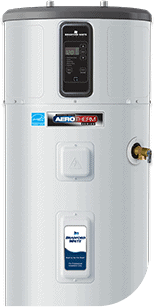Deciding Between Water Heater Repair and Replacement

If your water heater isn’t working properly, it can be a big headache. Whether your water heater is leaking or not heating water to a consistent temperature, you’ll need to decide whether to repair or replace it. By making the right decision, you can save time, money and frustration. Here’s how to make the best choice for your home:
Signs Your Water Heater Might Need Repairs
Not all water heater issues require a full replacement. Some problems can be addressed quickly and affordably by repairing or maintaining your current unit. Common scenarios include:
- Fluctuating Water Temperature: If your water heater sometimes works perfectly and other times doesn’t, it could be due to a faulty thermostat or heating element—both of which are often repairable.
- Strange Noises: Rumbling or popping sounds can indicate sediment buildup in the tank. Flushing the tank can resolve this issue.
The age of your water heater is an important factor in deciding whether to repair or replace the unit. So if your water heater isn’t that old, it may make sense to repair it. But if it’s getting older, you’re probably better off replacing it.
Your plumbing professional can diagnose water heater problems accurately, perform important maintenance, handle any necessary repairs, and advise you when it makes financial sense to replace your water heater.
Don’t have a plumbing professional? Search here to find a Bradford White professional in your area.
When It’s Time to Replace Your Water Heater
Sometimes it makes financial sense to skip the repairs and replace your water heater with a brand new unit. Here are clear indicators that replacement might be the better option:
- Old Age: If your water heater is older and outside of its warranty period, investing in repairs might not be worth it. New models are more energy-efficient, which will save you money on utility bills in the long run.
- Frequent Repairs: Are you constantly fixing your water heater? Repeated repairs can add up, making a new unit the more cost-effective choice.
- Rusted Tank: Rust or corrosion on the tank is a major issue that cannot be fixed. (Similarly, if your hot water is red or rusty in color, which indicates rust inside your tank.) These are surefire signs that you need to replace your water heater.
- Declining Performance or Efficiency: If your water heater takes longer to heat water or fails to keep up with household demands, it may be on its last leg as a result of sediment buildup, and costing you more than you realize in monthly energy bills.
- Leaking Tank: Unlike minor valve leaks, a leak coming from your tank often signals that your water heater is beyond repair and needs to be replaced. The tank should be replaced quickly, before the leak worsens and causes water damage to your property.
Once you decide to replace your water heater, reach out to your plumbing professional to get a quote and schedule the job. By planning the replacement in advance, you’ll avoid the inconvenience of being out of hot water, prevent water damage from potential leaks, and you can take your time to choose the best water heater for your needs.
Choosing Between Repair and Replacement
Here are a few factors to consider when deciding whether to repair or replace your water heater:
- 1. Cost of Repair vs. Cost of New Unit
If the cost of repairs exceeds 50% of the cost of buying a new water heater, replacement is likely the smarter decision, especially if your water heater is older.
- 2. Energy Efficiency
Older or less efficient models may result in higher utility bills. Upgrading to a newer, more energy-efficient unit can save you money over time. You can even consider a heat pump water heater, which uses advanced technology to heat water more efficiently than a conventional electric water heater. Learn more about the heat pump water heaters offered by Bradford White here.
- 3. Water Heater Type
By deciding to replace your water heater, you can choose to upgrade or go from a traditional tank unit to a tankless water heater. This technology heats water on demand, eliminating the need for a storage tank and reducing standby energy loss. Tankless water heaters can also save you a lot of space. Check out Bradford White’s Infiniti® and KwickShot® tankless water heaters now.
- 4. Proactive vs. Emergency Replacement
When your water heater is nearing the end of its life, there are many advantages to proactively replacing the unit instead of waiting for it to fail completely. First, you avoid the inconvenience of being out of hot water for a time while the emergency replacement is scheduled and installed. Second, you prevent any potential water damage should your old water heater start to leak. Finally, when you proactively replace your water heater, you can take your time to select the best water heater for your needs to maximize performance and efficiency.
- 5. Your Long-Term Goals
Are you planning to stay in your home long-term or sell in the near future? Installing a new water heater can increase property value, making it a smart investment if you’re planning to sell.
Final Thoughts
Understanding when to choose water heater repair or replacement ultimately depends on factors like the age of your unit, the severity of the issue, and your budget. If you’re still unsure, contacting a trusted plumbing professional can help you make the most informed decision.
Don’t have a plumbing professional? Search here to find a Bradford White professional in your area.



